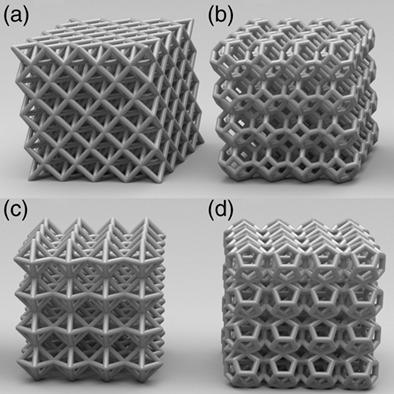当前位置:
X-MOL 学术
›
J. Appl. Polym. Sci.
›
论文详情
Our official English website, www.x-mol.net, welcomes your feedback! (Note: you will need to create a separate account there.)
Mechanical behavior of 3D-printed polymeric metamaterials for lightweight applications
Journal of Applied Polymer Science ( IF 3 ) Pub Date : 2021-09-10 , DOI: 10.1002/app.51618 Eliza Truszkiewicz 1 , Andreas Thalhamer 1 , Marlene Rossegger 1, 2 , Mario Vetter 1, 2 , Gerald Meier 1 , Elisabeth Rossegger 1 , Peter Fuchs 1 , Sandra Schlögl 1 , Michael Berer 1
Journal of Applied Polymer Science ( IF 3 ) Pub Date : 2021-09-10 , DOI: 10.1002/app.51618 Eliza Truszkiewicz 1 , Andreas Thalhamer 1 , Marlene Rossegger 1, 2 , Mario Vetter 1, 2 , Gerald Meier 1 , Elisabeth Rossegger 1 , Peter Fuchs 1 , Sandra Schlögl 1 , Michael Berer 1
Affiliation

|
Artificially structured materials, also called metamaterials, can achieve very unique properties due to the fact that their attributes are mainly derived from the design of the structures. This work gives an overview of the mechanical behavior of four differently designed and 3D-printed metamaterial structures. For each structure, both, the printing technique and the materials used for printing were varied. In total four different polymers were investigated and processed with three different 3D-printing techniques. Their mechanical behavior was studied by compression tests, which showed the wide range of material properties that can be achieved by utilizing the different materials/3D-printing techniques. In addition, bending tests of 3D-printed bending specimens were conducted to provide material data for subsequent finite element simulation of the structures. The comparison of experiments and numerical simulations gave further insight into local deformation mechanisms and allowed for a better understanding of the overall deformation behavior.
中文翻译:

用于轻量化应用的 3D 打印聚合物超材料的机械性能
人工结构材料,也称为超材料,可以实现非常独特的特性,因为它们的属性主要来自结构的设计。这项工作概述了四种不同设计和 3D 打印的超材料结构的机械行为。对于每种结构,印刷技术和用于印刷的材料都是不同的。总共研究了四种不同的聚合物,并使用三种不同的 3D 打印技术进行了加工。通过压缩测试研究了它们的机械行为,这表明利用不同的材料/3D 打印技术可以实现广泛的材料特性。此外,进行了 3D 打印弯曲试样的弯曲试验,为随后的结构有限元模拟提供材料数据。实验和数值模拟的比较进一步了解局部变形机制,并允许更好地了解整体变形行为。
更新日期:2021-11-01
中文翻译:

用于轻量化应用的 3D 打印聚合物超材料的机械性能
人工结构材料,也称为超材料,可以实现非常独特的特性,因为它们的属性主要来自结构的设计。这项工作概述了四种不同设计和 3D 打印的超材料结构的机械行为。对于每种结构,印刷技术和用于印刷的材料都是不同的。总共研究了四种不同的聚合物,并使用三种不同的 3D 打印技术进行了加工。通过压缩测试研究了它们的机械行为,这表明利用不同的材料/3D 打印技术可以实现广泛的材料特性。此外,进行了 3D 打印弯曲试样的弯曲试验,为随后的结构有限元模拟提供材料数据。实验和数值模拟的比较进一步了解局部变形机制,并允许更好地了解整体变形行为。


























 京公网安备 11010802027423号
京公网安备 11010802027423号